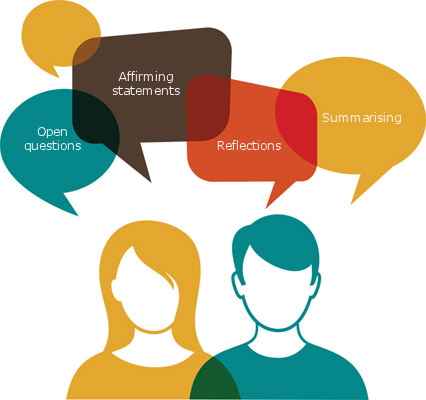Communication Skills in Young People for GP/Family Medicine professionals



This session covers some of the basic principles of communication skills that are important when dealing with patients of any age, but are particularly relevant to young people who are experiencing changes in their appearance, the way they think, or their relationships with parents and friends. It focuses on the need to adapt communication to fit with the language and cognitive skills of the young person, which will change as they go through adolescence.
Learning Objectives
By the end of this session you will be able to:
- Consider the importance of effective communication with young people in health care settings
- Evaluate the impact of adolescent development on communication, including the use of language and cognitive processing
- Adapt communication to the age and developmental stage of the young person
- Demonstrate critical awareness of basic communication skills with young people, including the use of verbal and non-verbal communication and the recognition of non-verbal cues
Introduction
As young people go through adolescence their communication skills develop. Their vocabularies develop, as do the ways that they think about themselves and the world.
Health professionals need to be able to adapt to these changes in order to make sure that they get their message across effectively and avoid being patronising.
One of the most common criticisms that young people have of their experiences of health care is the poor communication between themselves and the health care professional involved.
Dr Deborah Christie is a Consultant Clinical Psychologist, Honorary Reader and Clinical Lead for Paediatric and Adolescent Psychological Services at University College London Hospitals NHS Foundation Trust. She works with young people searching for ways to live with chronic illness including diabetes, obesity, arthritis, chronic fatigue and chronic pain syndromes. Current research interests include neuropsychological outcomes in children and adolescent survivors of meningitis, quality of life measures in chronic illness and the development of effective multidisciplinary interventions for diabetes and obesity in children and adolescents.


Dick Churchill is a GP in Nottingham and former Associate Clinical Professor at the University of Nottingham. He has both clinical and academic interests in the health of young people and in mental health issues. He is a member of the RCGP Adolescent Health Group and a founder of the Association for Young People’s Health.
- Communication Skills in Young People course for GP...
- Posted By eIntegrity Healthcare e-Learning
- Posted Date: 2025-01-15
- Location:Online
- This session covers some of the basic principles of communication skills that are important when dea...
- Safeguarding Adolescents course for GPs
- Posted By eIntegrity Healthcare e-Learning
- Posted Date: 2025-01-15
- Location:Online
- This session aims to help you understand specific issues relating to child protection for adolescent...
- Confidentiality course for GPs
- Posted By eIntegrity Healthcare e-Learning
- Posted Date: 2025-01-15
- Location:Online
- This session introduces the main principles and legal aspects of confidentiality as applied to the c...
- Capacity and Consent course for GPs
- Posted By eIntegrity Healthcare e-Learning
- Posted Date: 2025-01-15
- Location:Online
- This session explores the UK legal framework for assessing competence in young people, with particul...
- The Legal Framework for Working with Young People ...
- Posted By eIntegrity Healthcare e-Learning
- Posted Date: 2025-01-15
- Location:Online
- This session is an introduction to professional, legal and ethical issues concerning young people an...








